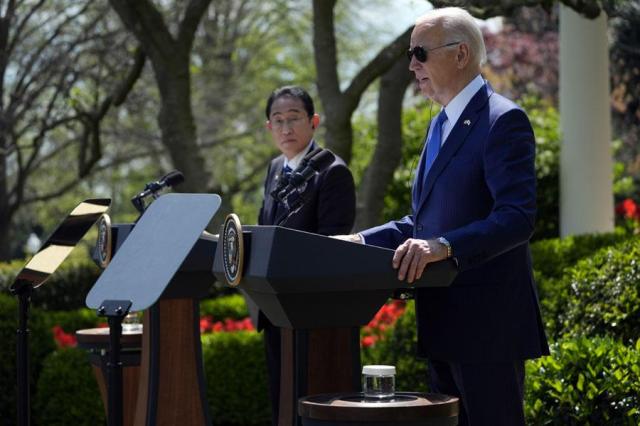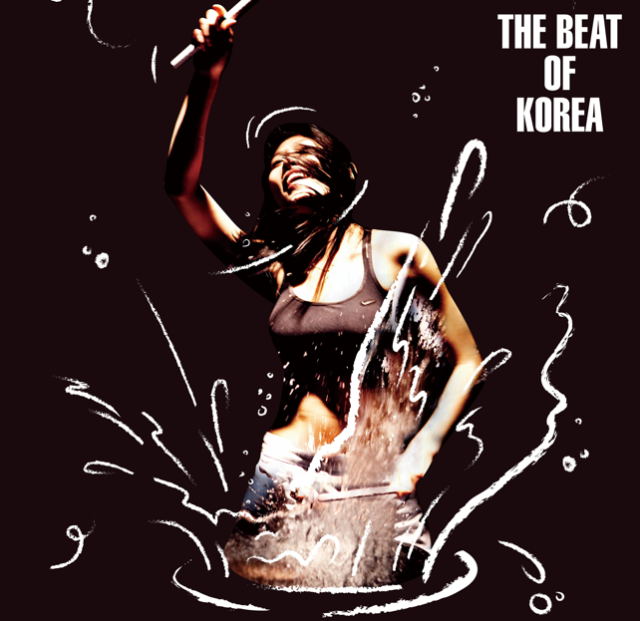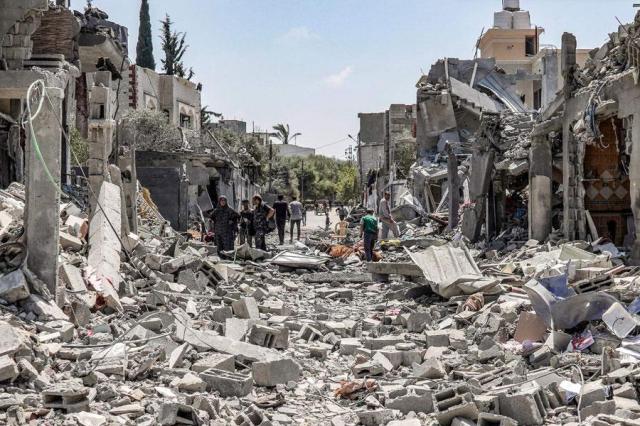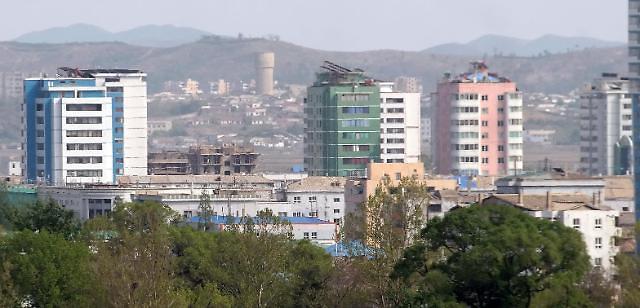
Solar panels are built on top of buildings in Sinuiju, the North Korean city near the border with China. [Photograph by Yoo se-woong]
(Editors Note: This article was contributed by Bae In-sun, an Aju Business Daily writer who visited Dandong and nearby areas along the border between China and North Korea to get a glimpse of changes in the communist country following a historic inter-Korean summit in April.)
By Bae In-sun
DANDONG -- The skyline of Sinuiju, a hot place for cross-border trade in the northwestern border between North Korea and China, is getting higher with the erection of new high-rise apartments and other buildings being built by North Korean capitalists.
The scene observed by visitors to Dandong, a Chinese trading city located at the estuary of the Yalu River, could be superficial, but experts and Chinese traders agree North Korea is clearly taking a new stance in its economic policy to embrace reform and openness, regardless of whether it is spontaneous or forced by international sanctions.
"The center of Pyongyang was like Shenzhen. It's very busy," said Wang, a Chinese businessman based in Dandong, which accounts for 80 percent of trade between North Korea and China and has long been regarded as a place for major activities by North Korean traders. Shenzhen in southeastern China is a modern metropolis promoted as a special economic zone in 1978.
Wang, a native in Dandong who identified himself only by his surname, spoke with an exaggerated gesture that Pyongyang is developing as fast as Shenzhen. In Dandong, foreign visitors can get a glimpse of changes being made in North Korea.
"Kim Jong-un's regime guaranteed the autonomy of entrepreneurs through the May 30, 2014 statement, and a law has been revised to allow an investment by 'Donju' (wealthy people with rich cash assets)," Kim Young-hee, a defector-turned economist from Seoul, told Aju News in an interview.
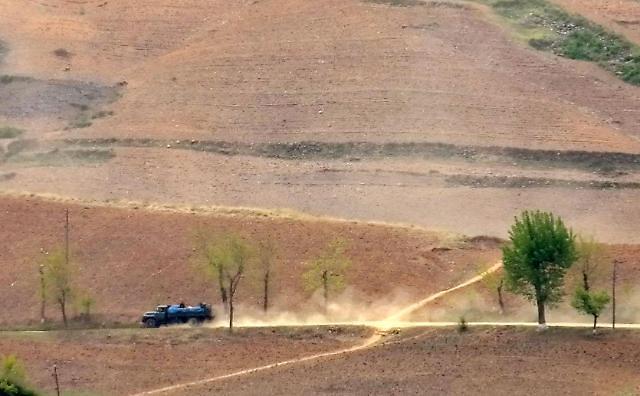
A truck races on a red cray road, leaving a trail of dust in the border county of Sakchu in North Korea. [Photograph by Yoo se-woong]
-- MORE VIBRANT MARKET ACTIVITIES THAN BEFORE CAN BE SEEN --
Helped by vibrant market activities, real estate investment is becoming more active than before in Pyongyang and other major cities, the economist said.
"Housing prices in major cities such as Pyongyang and Sinuiju have risen steadily since the mid-1990s," he said, adding that despite legal barriers, many houses have been built in Pyongyang around 2000 due to active participation by private investors in real estate development. "Because there is so much supply, reform and openness will result in a legitimate deal."
In Sinuiju, large and small solar panels installed in the roofs of downtown buildings, factories and houses could be seen, reflecting a new policy to use solar energy widely. Up to 40 percent of ordinary households in North Korea use solar energy because the regime, which has suffered difficulties in supplying crude oil and electric power due to U.S.-led sanctions, has actively developed the solar energy industry.
In major cities such as Pyongyang and Nampo, buses using solar energy have been introduced since 2015. From 2016, Pyongyang citizens commute across the Taedong River, which flows through the capital, aboard a solar energy cruise ship. Ironically, sanctions have stimulated the North's economic self-sufficiency and the development of scientific and technology research for a surviving strategy.
Experts say North Korea's information technology skills are relatively good, having developed independent software in various fields. Statistics show some four million people, or 16 percent of its population, use smartphones. "Young people in their 20s and 30s in Pyongyang are considering smartphones as a necessity," Kim said.
The spread of smartphones has affected the daily lives of North Koreans, he said. "It is a small beginning, but it is an example showing North Korea is moving into a market economy system."
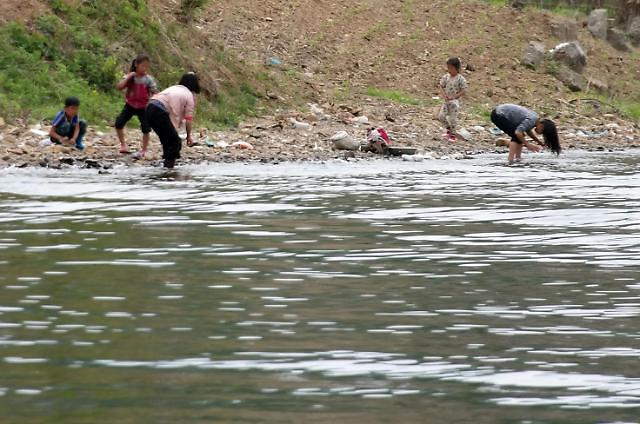
North Koreans wash at the riverside of the Yalu River along the border with China. [Photograph by Yoo se-woong]
-- JANGMADAN GROWS STEADILY DESPITE INTERNATIONAL SANCTIONS --
"It has been 23 years since a Jangmadang (open market grounds) system appeared in North Korea," Kim said. "Jangmadang, which has been steadily growing since the mid-1990s, became larger and more organized," he said, adding that although not legal, it has been allowed with connivance.
"The maintenance of Janmadang is directly linked to the survival of North Koreans. Since the government is not able to guarantee the distribution of food, North Koreans are looking for their livelihood through Jangmadang, and the market system and prices have stabilized now, with even sanctions unable to shake it at all," the economist said.
The so-called "big hands" in Jangmadang are traders who earned money through transactions across the border with China. In Dandong, which accounts for 80 percent of trade between North Korea and China, is a place for major activities by North Korean traders.
North Koreans were seen carrying big paper boxes like traders at the border checkpoints in Dandong, many of them middle-aged and standing in groups of six or seven. Popular items North Korean traders purchase in China are skin care products priced at up to 50,000 won ($46.3). Considering that the average salary of North Korean workers is around $20, it is quite a luxury.
Trade in the past was led by officials under state control, but private dealers are collecting capital to create trade firms like a cooperative because the regime is eager to earn foreign currency, Kim said.
"They can get a loan from the central bank and proceed with mergers and acquisitions," he said, adding trade cooperatives are doing some sort of capitalist business activities because they make profits and pay corporate taxes. "The change is something that was never imagined before."
North Korean traders had to participate in the frequent political education of ideology in the past, but they now say such compulsory education has become less common, said Park Yong-wan, who leads an association of South Korean residents in Shenyang, the capital and largest city of China's northeast Liaoning Province.
"In the past, when we had a business meeting with a North Korean company, it was common to meet one business executive and two political supervisors, but nowadays, there are many (traders) coming alone," Parks said. "It shows North Korea's willingness to work efficiently and not to waste unnecessary human resources."
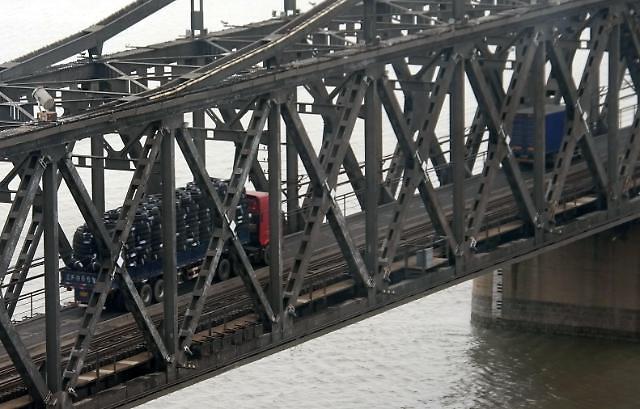
A truck full of supplies moves on a border bridge to Sinuiju, North Korea, from Dandong, China. [Photograph by Yoo se-woong]
-- REFORM AND OPENNESS ARE NO MORE TABOO IN NORTH KOREA --
An observation team dispatched by the North's ruling Workers' Party to China for 11 days from May 14 revealed the regime's proactive changes. "We have come to learn about China's economic development, reform and openness," the delegation said at a meeting with Chinese President Xi Jinping.
Reform and openness, which used to be taboo in North Korea, have already begun, the economist said, adding a groundbreaking attempt was made in the "June 28 policy" initiated by the North's leader in 2012 to encourage individual and corporate economic activities.
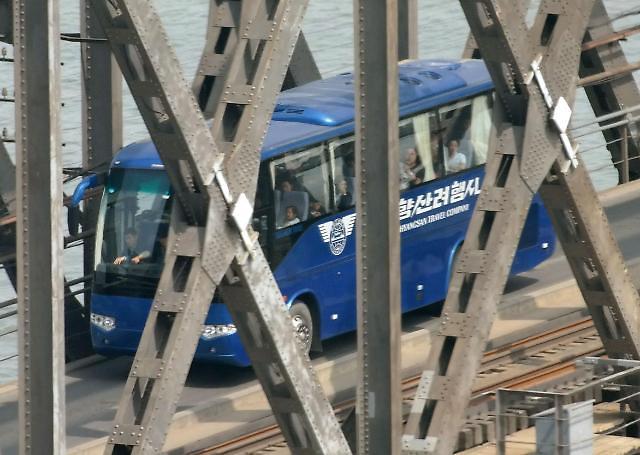
A bus carrying Chinese tourists crosses a border bridge from North Korea. [Photograph by Yoo se-woong]
First, the number of state cooperative farms was reduced, and individual agricultural productivity increased. Second, autonomy was imposed on corporate management so that a company can establish its own production plan, sell products and carry out independent commercial activities. In November of the following year, North Korea designated five special economic zones and 13 economic development zones to promote economic development.
"Recently, North Korea is supplementing the legal system for attracting foreign investors," Kim said, as the regime provides the security of foreign investors and establishes infrastructures in preparation for a new ear free of sanctions.


